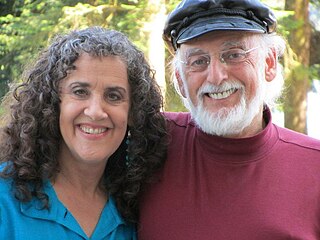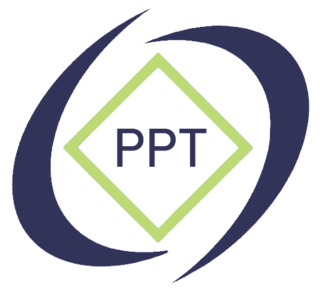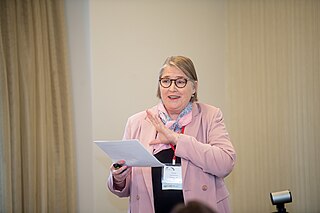Transference is a phenomenon within psychotherapy in which repetitions of old feelings, attitudes, desires, or fantasies that someone displaces are subconsciously projected onto a here-and-now person. Traditionally, it had solely concerned feelings from a primary relationship during childhood.
Couples therapy attempts to improve romantic relationships and resolve interpersonal conflicts.
Psychodynamic psychotherapy and psychoanalytic psychotherapy are two categories of psychological therapies. Their main purpose is revealing the unconscious content of a client's psyche in an effort to alleviate psychic tension, which is inner conflict within the mind that was created in a situation of extreme stress or emotional hardship, often in the state of distress. The terms "psychoanalytic psychotherapy" and "psychodynamic psychotherapy" are often used interchangeably, but a distinction can be made in practice: though psychodynamic psychotherapy largely relies on psychoanalytical theory, it employs substantially shorter treatment periods than traditional psychoanalytical therapies. Psychodynamic psychotherapy is evidence-based; the effectiveness of psychoanalysis and its relationship to facts is disputed.

John Mordecai Gottman is an American psychologist and professor emeritus of psychology at the University of Washington. His research focuses on divorce prediction and marital stability through relationship analyses. Insights from Gottman's work have significantly impacted the field of relationship counseling, aiming to enhance relationship functioning and mitigate behaviors detrimental to human relationships. Gottman's work has also influenced the development of important concepts on social sequence analysis.
Intensive short-term dynamic psychotherapy (ISTDP) is a form of short-term psychotherapy developed through empirical, video-recorded research by Habib Davanloo.
Dyadic developmental psychotherapy is a psychotherapeutic treatment method for families that have children with symptoms of emotional disorders, including complex trauma and disorders of attachment. It was originally developed by Arthur Becker-Weidman and Daniel Hughes as an intervention for children whose emotional distress resulted from earlier separation from familiar caregivers. Hughes cites attachment theory and particularly the work of John Bowlby as theoretical motivations for dyadic developmental psychotherapy.
In psychology, the theory of attachment can be applied to adult relationships including friendships, emotional affairs, adult romantic and carnal relationships and, in some cases, relationships with inanimate objects. Attachment theory, initially studied in the 1960s and 1970s primarily in the context of children and parents, was extended to adult relationships in the late 1980s. The working models of children found in Bowlby's attachment theory form a pattern of interaction that is likely to continue influencing adult relationships.
Interpersonal psychotherapy (IPT) is a brief, attachment-focused psychotherapy that centers on resolving interpersonal problems and symptomatic recovery. It is an empirically supported treatment (EST) that follows a highly structured and time-limited approach and is intended to be completed within 12–16 weeks. IPT is based on the principle that relationships and life events impact mood and that the reverse is also true. It was developed by Gerald Klerman and Myrna Weissman for major depression in the 1970s and has since been adapted for other mental disorders. IPT is an empirically validated intervention for depressive disorders, and is more effective when used in combination with psychiatric medications. Along with cognitive behavioral therapy (CBT), IPT is recommended in treatment guidelines as a psychosocial treatment of choice for depression.
The developmental needs meeting strategy (DNMS) is a psychotherapy approach developed by Shirley Jean Schmidt. It is designed to treat adults with psychological trauma wounds and with attachment wounds. The DNMS is an ego state therapy based on the assumption that the degree to which developmental needs were not adequately met is the degree to which a client may be stuck in childhood. This model aims to identify ego states that are stuck in the past and help them get unstuck by remediating those unmet developmental needs. The processing starts with the DNMS therapist guiding a patient to mobilize three internal Resource ego states: a Nurturing Adult Self, a Protective Adult Self, and a Spiritual Core Self. The therapist then guides these three Resources to gently help wounded child ego states get unstuck from the past by meeting their unmet developmental needs, helping them process through painful emotions, and by establishing an emotional bond. The relationship wounded child parts have with these Resources is considered the primary agent for change.

Daniel J. Siegel is a clinical professor of psychiatry at the UCLA School of Medicine and executive director of the Mindsight Institute.
Emotionally focused therapy and emotion-focused therapy (EFT) are related humanistic approaches to psychotherapy that aim to resolve emotional and relationship issues with individuals, couples, and families. These therapies combine experiential therapy techniques, including person-centered and Gestalt therapies, with systemic therapy and attachment theory. The central premise is that emotions influence cognition, motivate behavior, and are strongly linked to needs. The goals of treatment include transforming maladaptive behaviors, such as emotional avoidance, and developing awareness, acceptance, expression, and regulation of emotion and understanding of relationships. EFT is usually a short-term treatment.
Attachment-based psychotherapy is a psychoanalytic psychotherapy that is informed by attachment theory.
Attachment-based therapy applies to interventions or approaches based on attachment theory, originated by John Bowlby. These range from individual therapeutic approaches to public health programs to interventions specifically designed for foster carers. Although attachment theory has become a major scientific theory of socioemotional development with one of the broadest, deepest research lines in modern psychology, attachment theory has, until recently, been less clinically applied than theories with far less empirical support. This may be partly due to lack of attention paid to clinical application by Bowlby himself and partly due to broader meanings of the word 'attachment' used amongst practitioners. It may also be partly due to the mistaken association of attachment theory with the pseudo-scientific interventions misleadingly known as attachment therapy. The approaches set out below are examples of recent clinical applications of attachment theory by mainstream attachment theorists and clinicians and are aimed at infants or children who have developed or are at risk of developing less desirable, insecure attachment styles or an attachment disorder.

Positive psychotherapy is a psychotherapeutic method developed by psychiatrist and psychotherapist Nossrat Peseschkian and his co-workers in Germany beginning in 1968. PPT is a form of humanistic psychodynamic psychotherapy and based on a positive conception of human nature. It is an integrative method that includes humanistic, systemic, psychodynamic, and cognitive-behavioral elements. As of 2024, there are centers and training available in twenty countries. It should not be confused with positive psychology.
Louis John Cozolino is an American psychologist and professor of psychology at Pepperdine University. He holds degrees in philosophy from the State University of New York at Stony Brook, theology from Harvard University and a Ph.D. in clinical psychology from UCLA. He has conducted empirical research in schizophrenia, the long-term impact of stress, and child abuse. Cozolino has published numerous articles, several books, and maintains a clinical and consulting practice in Los Angeles.
Family therapy is a branch of psychotherapy focused on families and couples in intimate relationships to nurture change and development. It tends to view change in terms of the systems of interaction between family members.
Control mastery theory or CMT is an integrative theory of how psychotherapy works, that draws on psychodynamic, relational and cognitive principles. Originally the theory was developed within a psychoanalytical framework, by psychoanalyst and researcher Joseph Weiss, MD (1924-2004). CMT is also a theory of how the mind operates, with an emphasis of the unconscious, and how psychological problems may develop based on traumatic experiences early in life. The name of the theory comes from two central premises; the assumption that people have control over their mental content, and the belief that patients who come to therapy are fundamentally motivated to master their lives.
Interpersonal neurobiology (IPNB) or relational neurobiology is an interdisciplinary framework that was developed in the 1990s by Daniel J. Siegel, who sought to bring together scientific disciplines to demonstrate how the mind, brain, and relationships integrate. IPNB views the mind as a process that regulates the flow of energy and information through its neurocircuitry, which is then shared and regulated between people through engagement, connection, and communication. Drawing on systems theory, Siegel proposed that these processes within interpersonal relationships can shape nervous system maturation. Siegel claimed that the mind has an irreducible quality which informs this approach.
David Morris Schnarch ; September 18, 1946, in New York City, New York – October 8, 2020, in Evergreen, Colorado) was an American couples, sex and trauma therapist, clinical psychologist and urologist.

Rosjke Hasseldine is a Dutch-New Zealand-American author, mother-daughter therapist/coach, and speaker, known for her research and practice in the field of mother-daughter relationships, and creating the Mother-Daughter Attachment Model, a systemic trauma-informed model that helps women understand the underlying dynamics in their mother-daughter relationship, the causes of relationship conflict, inherited generational themes, and generational trauma. She founded a training organization called Mother-Daughter Coaching International that trains mental health professionals and coaches about mother-daughter attachment dynamics, and she is a blogger on Medium and the author of The Silent Female Scream and The Mother Daughter Puzzle.





